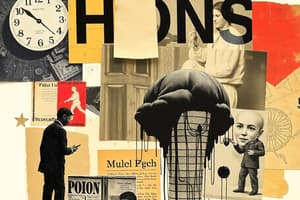Podcast
Questions and Answers
What is literacy?
What is literacy?
Literacy is the ability to read, write, speak and listen in a way that lets us communicate effectively and make sense of the world.
What is the significance of literacy according to the National Literacy Trust?
What is the significance of literacy according to the National Literacy Trust?
Literacy is as a means of identification, understanding, interpretation, creation, and communication in an increasingly digital, text-mediated, information-rich, and fast-changing world.
What are the roles of reading in our lives?
What are the roles of reading in our lives?
- Access to Information and Knowledge
- Promotion of Critical Thinking and Empathy
- Facilitation of Communication and Dialogue
- Empowerment and Agency
- All of the above (correct)
What are the challenges, barriers, and difficulties in reading as highlighted in the content?
What are the challenges, barriers, and difficulties in reading as highlighted in the content?
Flashcards are hidden until you start studying
Study Notes
Definition and Significance of Literacy
- Literacy is the ability to read, write, speak, and listen effectively to communicate and make sense of the world.
- It is a means of identification, understanding, interpretation, creation, and communication in a digital, text-mediated, and information-rich world.
- Literacy is beyond basic reading and writing skills, it encompasses financial, health, digital, and visual literacy.
Evolution of Literacy
- The first known writing system was the cuneiform script, invented in southern Mesopotamia circa 3000 BCE.
- The invention of the printing press in the 1450s made books more accessible to the masses.
- The evolution of literacy has transformed from clay tablets to digital media.
Importance of Literacy and Reading
- Literacy gives individuals skills and competence to function effectively in society.
- It encourages social contribution, empowers and liberates individuals, reducing poverty and social inequality.
- Literacy has a positive impact on health, sustainable development, and access to better job opportunities.
- Women empowered by literacy have a ripple effect on development, leading to improved health and education outcomes.
- Reading enables individuals to engage with their communities, promoting critical thinking, empathy, and cultural preservation.
Reading Process
- Reading is a complex cognitive process involving interdependent cognitive skills.
- It links cognitive, linguistic, and sociocultural dimensions, requiring the ability to make sense of texts and connect to prior knowledge.
- The reading process involves decoding, comprehension, fluency, vocabulary, and higher-order thinking skills.
- Building blocks of reading include phonemic awareness, phonics, fluency, vocabulary, and comprehension.
Challenges in Reading
- Challenges arise from the interplay between linguistic, cognitive, and socio-cultural factors.
- Linguistic factors include language proficiency, language variation, and multilingualism.
- Cognitive factors include decoding skills, vocabulary, knowledge, and background knowledge.
- Socio-cultural factors include cultural background, social identity, literacy practices, and knowledge.
Reading Models
- Reading models are ways educators instruct and teach reading, each based on a belief or philosophy on how children learn to read.
- The three main reading models are top-down, bottom-up, and interactive.
Studying That Suits You
Use AI to generate personalized quizzes and flashcards to suit your learning preferences.




